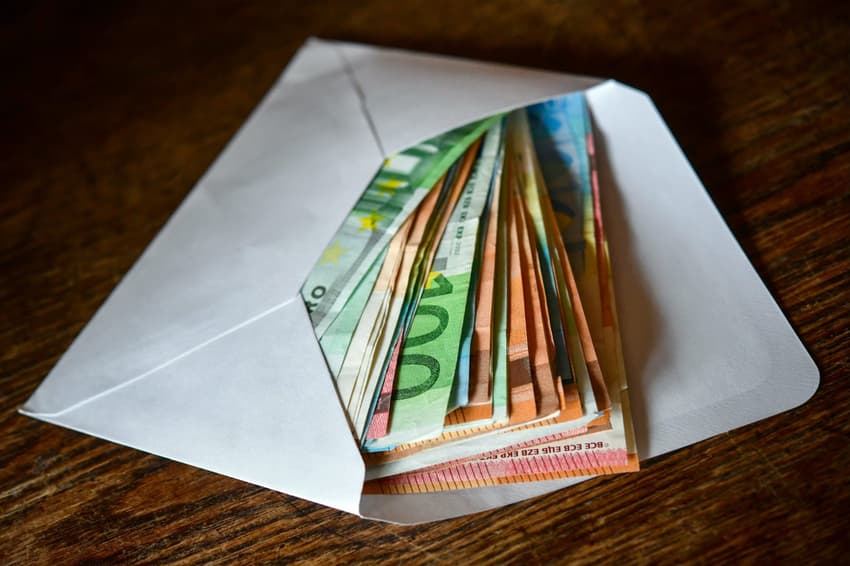German pensioner loses €20k in cash after leaving it on car roof

It's not unusual for Germans to carry a lot of cash. But for one man in North Rhine-Westphalia, taking out banknotes turned into a nightmare.
The 69-year-old man in Witten, near Bohum in western Germany, withdrew €20,000 of cash from a bank last Friday in order to buy a new car, police said in a statement.
He then placed the envelope with the cash on the roof of his current car. However, he forgot about the envelope and drove off.
A short time later, police said the man noticed that the envelope had disappeared.
Police are urgently appealing for anyone who finds the money to hand it into a lost property office or to the police so that the large sum can be reunited with the pensioner.
The man withdrew the cash at around 3.40pm on Friday, November 22nd from a bank at Ruhrstraße 45 in Witten. He drove off in the direction of Husemannstraße.
READ ALSO:
-
Card payments outstrip cash for the first time in Germany
-
Vast majority of Germans never want to give up cash, poll shows
Police appealed on Twitter for anyone with information to get in touch.
Kuvert aufs Autodach gelegt und losgefahren: Senior verliert am Freitag 20.000 Euro im Bereich Ruhrstraße in #Witten.
❗Wer das registrierte Geld findet, bringt es bitte umgehend zur Polizei❗
? Zeugentelefon: 02302 / 209-8305 oder 0234 / 909-4441
Infos: https://t.co/Q9DZhoSDzU pic.twitter.com/klNpJIwUSk
— Polizei NRW BO (@polizei_nrw_bo) November 26, 2019
A nation of cash lovers
Although things are changing slowly as card payments become more popular, Germany is known for its Bargeld (cash) culture, and it's not unusual to pay for expensive items with cash.
READ ALSO: Will the German love affair with cash ever end?
In fact, hardly any other nation likes paying with banknotes as much as the Germans do.
According to Barkow Consulting, only about every 20th payment in Germany is processed by credit card. Statistically speaking, founder Peter Barkow said each German citizen keeps €2,200 cash at home.
Germans carried an average of €103 in their wallets in 2016, a study by the European Central Bank revealed, compared with an average of only €65 in the Eurozone.
Comments
See Also
The 69-year-old man in Witten, near Bohum in western Germany, withdrew €20,000 of cash from a bank last Friday in order to buy a new car, police said in a statement.
He then placed the envelope with the cash on the roof of his current car. However, he forgot about the envelope and drove off.
A short time later, police said the man noticed that the envelope had disappeared.
Police are urgently appealing for anyone who finds the money to hand it into a lost property office or to the police so that the large sum can be reunited with the pensioner.
The man withdrew the cash at around 3.40pm on Friday, November 22nd from a bank at Ruhrstraße 45 in Witten. He drove off in the direction of Husemannstraße.
READ ALSO:
- Card payments outstrip cash for the first time in Germany
- Vast majority of Germans never want to give up cash, poll shows
Police appealed on Twitter for anyone with information to get in touch.
Kuvert aufs Autodach gelegt und losgefahren: Senior verliert am Freitag 20.000 Euro im Bereich Ruhrstraße in #Witten.
— Polizei NRW BO (@polizei_nrw_bo) November 26, 2019
❗Wer das registrierte Geld findet, bringt es bitte umgehend zur Polizei❗
? Zeugentelefon: 02302 / 209-8305 oder 0234 / 909-4441
Infos: https://t.co/Q9DZhoSDzU pic.twitter.com/klNpJIwUSk
A nation of cash lovers
Although things are changing slowly as card payments become more popular, Germany is known for its Bargeld (cash) culture, and it's not unusual to pay for expensive items with cash.
READ ALSO: Will the German love affair with cash ever end?
In fact, hardly any other nation likes paying with banknotes as much as the Germans do.
According to Barkow Consulting, only about every 20th payment in Germany is processed by credit card. Statistically speaking, founder Peter Barkow said each German citizen keeps €2,200 cash at home.
Germans carried an average of €103 in their wallets in 2016, a study by the European Central Bank revealed, compared with an average of only €65 in the Eurozone.
Join the conversation in our comments section below. Share your own views and experience and if you have a question or suggestion for our journalists then email us at [email protected].
Please keep comments civil, constructive and on topic – and make sure to read our terms of use before getting involved.
Please log in here to leave a comment.